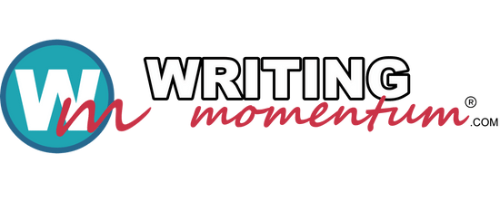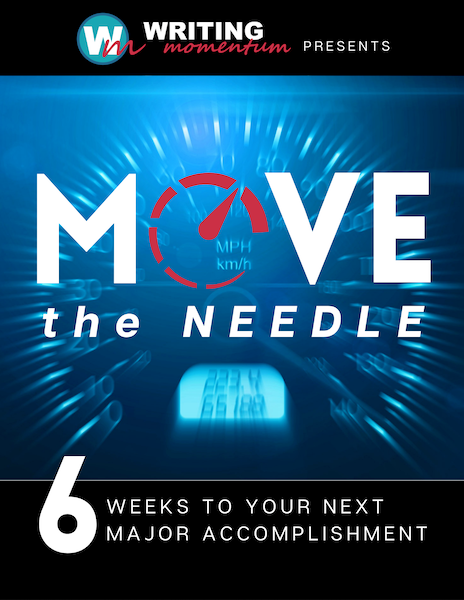Episode 135
The ONE Question You Should Ask Your Editor
In this episode, we explore a pivotal shift in approaching editors, coaches, and critiquers for writing feedback. Instead of asking, 'What do you think?' transform your question to 'How can I make this better?' This subtle change encourages constructive criticism and positions both you and your editor in a mindset for improvement. Join us as we dive into the practical implications and benefits of this question, drawing from personal experiences and insights from experienced writers and editors. Don't miss out on tips to enhance your writing and get the most out of your feedback sessions.
- 00:00 The One Question to Ask Your Editor
- 00:20 A Personal Shift in Writing Approach
- 01:56 Changing the Feedback Question
- 03:36 Real-Life Application of the New Question
- 05:37 The Impact of Asking 'How Can I Make This Better?'
- 08:21 Continuous Learning in Writing
- 11:09 Join Our Writing Community
- 11:58 Conclusion and Call to Action
LINKS:
- Liz Wilcox's Email Marketing Membership at http://wmdeal.com/liz
- Get your FREE Move the Needle goal-setting for authors ebook at https://www.writingmomentum.com
- Write with us! Join our writing membership and get your book DONE! https://www.writingmomentum.com/membership
Transcript
What's the one question you should ask your editor?
Gena:I can help with that.
Christopher:I'm not even sure if I said that right.
Christopher:I said editor.
Gena:It'll work.
Gena:We'll go with it.
Christopher:What's the one question you should ask your editor?
Christopher:That's the question.
Gena:That's the question.
Gena:That's the question we're going to answer today.
Gena:I am actually sharing a bit of a shift that I've made recently in my writing.
Gena:And I just thought I would, uh, share about it on this podcast.
Gena:This is kind of a personal one for me that, um, that I just wanted to share
Gena:because it has made such a difference in the way I approach, uh, my editors
Gena:and my coaches and anyone that I really go to for, feedback on my writing.
Christopher:Yeah, because usually when you ask for feedback from an editor
Christopher:or a coach or someone else, you've got, you basically just say, hey,
Christopher:would you take a look at this, right?
Gena:Yeah, or I would say, I would often say, um, what do you think of this?
Gena:I would hand that.
Gena:What do you think?
Gena:What do you think?
Gena:And, um, I would find it that when I would get the feedback and I am talking
Gena:about, uh, editors, I'm talking about, uh, coaches, I'm talking about critiquers,
Gena:I'm talking about just anybody that I was looking for feedback with, I would
Gena:hand it to them and often I would hand it to them and say, so what do you think?
Gena:And that automatically put me in the place of expecting them
Gena:to love it as much as I did.
Christopher:Because you were thinking they don't want to
Christopher:disappoint you and so they're just...
Gena:I would, I think I thought, this is really good, I want
Christopher:Naturally.
Gena:I just, this is good.
Gena:I want you to tell me what you think about this.
Gena:And I have recently changed that question.
Gena:And by changing the question, it puts me in a completely different place.
Christopher:So the question is now, how much can I pay you to give me
Christopher:great feedback about this, right?
Gena:No, the question is, how can I make this better?
Christopher:How can I make this better?
Christopher:So not, what do you think about this?
Christopher:But how can I make this better?
Christopher:So that automatically then, instead of just giving them a, yeah,
Christopher:or having them respond with a, yeah, it's good or no, it's not.
Christopher:It's actually puts them in a position of almost teaching.
Gena:Yes.
Gena:I think it gives the critiquer, the editor, the coach, the permission and the,
Gena:um, inducement, To give feedback of, well, I really liked this, but I think this part
Gena:could be stronger, or I really like the way you did this, but, um, I think you
Gena:could change this up, or maybe I would rearrange these things here, and by doing
Gena:that, I feel like it also, so it, it, for the editor, or the person answering
Gena:that question, it puts them in a position to teach, like you say, in a position
Gena:to really think about the feedback that they're giving, but it also puts me in
Gena:a place where I am not automatically thinking that a person's going to like
Gena:it, but it puts me in a position to receive and a position to be ready
Gena:for the changes that need to be made.
Christopher:I just realized, I think you used this Jedi mind trick on me.
Gena:I did.
Christopher:You just asked me last night to edit a article that you've written.
Gena:I've written an article.
Christopher:And you didn't say, um, can you edit this?
Christopher:Is it good enough?
Christopher:Anything like that.
Christopher:You said, how can I make this better?
Gena:I did.
Christopher:And what did I do?
Gena:You came back and you said, these are the things that
Gena:I thought you did really well.
Gena:You even said, I think it's better than you think it is.
Gena:Cause I wasn't sure.
Gena:It was one of those pieces that was just a very, uh, very big encompassing piece.
Gena:This was like a 1500 word.
Gena:really close to 2000 word article.
Gena:And so I really wanted to make sure that it was, um, as concise as it
Gena:needed to be and that it really kind of told a story and that it kept
Gena:within, uh, that client's voice.
Gena:Um, so it did that, but also, by putting it into the place of asking
Gena:you, what can I do to make it better?
Gena:You actually came back and you said, I think it's better than you think it is.
Gena:Cause I wasn't really sure I'd worked on this thing for so long.
Gena:And if you all know what I'm talking about, sometimes you can work on a
Gena:piece so long that you get to the place that you're like, I don't even
Gena:know if this is good or if I'm just like, spinning my wheels and just
Gena:changing things and I don't even know.
Gena:Like I've worked on it so long and made so many changes to it, I wasn't really sure.
Gena:But then you came back and you said, I think it's actually
Gena:better than you think it is.
Gena:But I actually think you need to strengthen this portion of it and
Gena:make that bigger and make that more, have a bigger piece of it.
Christopher:Have more impact.
Gena:To have more impact.
Gena:Because you know who I'm writing for.
Gena:Mm-Hmm.
Gena:. And you know that that particular piece, is very important to them.
Gena:So you said, I think it needs to be bigger.
Gena:And I said, okay, I'm going to make those changes.
Gena:So I went in and I started working on it and I was able to
Gena:make it finish it, turn it in.
Gena:Um, and I think the editor is going to really like it, but it just that switch
Gena:of asking, not what do you think, but changing it to how can I make this better?
Gena:It, it kind of sets me in a position to receive critique, and it also
Gena:sets the person reading it in a place to feel freedom to share
Gena:everything that they would change.
Christopher:Yeah.
Christopher:You know, I, now that I have been in editor's shoes a lot, there's
Christopher:a lot of times I'm editing pieces and often if someone asks me
Christopher:what I think about something, the question is generally kind of framed
Christopher:like, is this publishable, right?
Christopher:Is this something that is good enough to be published?
Christopher:And.
Christopher:Often that's what I'm reading for is, is this good enough to be published?
Christopher:And I, and I look at the piece and often I read something and
Christopher:I think, yeah, it's pretty good.
Christopher:I think, I think that's, that'll fit what the magazine is looking for.
Christopher:It'll be good.
Christopher:That'll fit.
Christopher:Send it off.
Christopher:Right.
Christopher:But that's different when, if someone were to ask me, how can I make this better?
Christopher:It does put me more in that mentorship role, right?
Christopher:Where I'm like, okay, I'm not just saying, yes, it can be published.
Christopher:But I'm saying, hmm, let's see how this can really shine.
Christopher:It's an interesting, it's an interesting Change, changing the way you just phrase
Christopher:something changes the way you think about it and changes the way the person
Christopher:who's receiving from you thinks about it.
Gena:It really does and I even, I work with a writing coach who I really
Gena:respect and who is really talented and so I've started using this question.
Gena:I don't go into our meetings thinking, do you like this?
Gena:Am I hitting the mark?
Gena:I go into it saying, how would you change this?
Gena:And how can I make this even stronger?
Gena:To which has been interesting because as I have heard from her, she has said.
Gena:Just exactly what you said.
Gena:She has said, you could publish this.
Gena:This is publishable and it's a new genre for me.
Gena:And she was saying, this is, you can do it.
Gena:This is good enough.
Gena:This meets the standard, um, of getting an editor's attention.
Gena:But she said, but I want to challenge you to go even farther.
Gena:I want you to go to another level.
Gena:Yeah.
Gena:To which my response was, I want to learn.
Gena:I want to learn how to take this to the, to the, as good as I can get it.
Gena:And while still keeping my voice, still keeping my perspective and my tone and
Gena:all of that, but still, uh, putting me in a place of, I want to learn.
Gena:And that's really what this is.
Gena:So, like I said, I'm sharing this with you guys because this is, you
Gena:know, Chris and I are in the trenches.
Gena:We are in the trenches here.
Gena:We, we are, we've been in the writing world for 30 years.
Gena:We have worked as editors, as writers, as ghostwriters, as marketers, a variety.
Gena:We've kind of worked in all different areas of this, but, uh, being in
Gena:this, we are continuing to learn.
Gena:We, there's never a time where we feel like, We've arrived and
Gena:we don't have anything to learn.
Gena:This is still Uh, an area where there's still areas of it that we want to grow in.
Christopher:Writing is a lifelong pursuit.
Christopher:And if you've been writing for a while, you know that you're always
Christopher:growing, always learning, always getting better at what you do.
Christopher:Yeah, we've been doing it for well over 30 years now.
Christopher:And now we're, and we're just like, man, there's still so much that we're learning
Christopher:and becoming better at all the time.
Gena:Absolutely.
Gena:And I think if it kind of like, have you ever had a favorite artist
Gena:who's a musician, a favorite musical artist and they come out with an
Gena:album that is somehow a little bit different from their last album.
Gena:Mm-Hmm.
Gena:. And you realize over time they're trying something new.
Gena:They're, they're sharpening, they're, they're kind of playing with some
Gena:new, uh, creative expression in that.
Christopher:Yes.
Gena:You know, the genre has changed a little bit.
Gena:Maybe they're changing some of their, uh, the ways that they do their songwriting.
Gena:Something like that.
Gena:And you can still hear them in it, but they're changing, they're playing, and I
Gena:think that's the same way with writing, that we can play, and we can write in
Gena:a way, and learn, and grow, and develop as writers, and we may change genres,
Gena:we may try some different techniques, we may do different things like that.
Gena:We're all still growing.
Gena:But, uh, anyway, getting back to this, this attitude of being in
Gena:this place and asking the question, how can I make this better?
Gena:It has really made a difference in the way that I approach my
Gena:editors, my coaches, my, just whoever, how can I make this better?
Christopher:Gena has said a few things.
Christopher:I hope you got ahold of this, that, um, She's not writing
Christopher:her material alone, right?
Christopher:She's working with other people.
Christopher:She has a, uh, mentor that's helping her write, right?
Christopher:The coach that's helping you write what you're writing.
Christopher:She's asking other people, editors, people like myself and others.
Christopher:What, how can I make this better?
Christopher:Right.
Christopher:And she does that because it makes her writing stronger.
Christopher:If you don't have someone like that in your life, find some people that
Christopher:you can share your writing with, that you want them to be supportive.
Christopher:You want them to be people who know the genre and the business, right?
Christopher:And so when you do that, it's just going to make your writing stronger.
Christopher:Part of the reason we, uh, we're thinking about a lot, a lot of this
Christopher:this week is because in our membership, which you can find at writingmomentum.
Christopher:com slash membership.
Christopher:Uh, we have critiques that we're now offering with Henry McLaughlin.
Christopher:He's been on the podcast the last couple of weeks and he's going to be giving
Christopher:critiques like this where he, where you can submit your first page of your work to
Christopher:him and say, how can I make this better?
Christopher:And he's going to share what he likes.
Christopher:He's going to share what can improve and hopefully stir up a good discussion.
Christopher:So if you're not part of a group like that, Hey, come join us.
Gena:Yeah, definitely.
Christopher:Um, but anyway, yeah, this is a, that's a really good question.
Christopher:I, I, uh, I'm going to start asking that myself.
Gena:I look forward to giving you feedback on that.
Christopher:Speaking of feedback, hey, go ahead and rate, review,
Christopher:subscribe, and share this podcast.
Christopher:Here's how you do that.
Christopher:On your podcast player, if you're listening on your iPhone, Go into the
Christopher:podcast player click on leave a review and just leave us a little review if you
Christopher:do that It helps other people find the podcast and improves their writing too
Christopher:And it's a way that you can kind of give back to this So we've had people say man,
Christopher:you give away such good free content.
Christopher:How can we help support that?
Christopher:Leave a review that helps so much We'd also love to have you join us in our
Christopher:membership because we think that's the way that we can really You Um,
Christopher:sharpen one another the best, uh, but definitely if you can just leave some
Christopher:feedback that that really is a blessing.
Christopher:Uh, because you know, we are not in this alone, together,
Gena:we have writing momentum.
Christopher:Bye bye.





